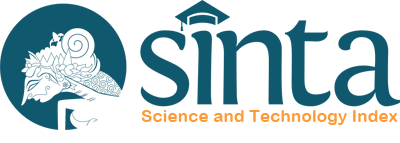The Effect of Snack Intervention toward Working Duration among Helper Workers in Container Company
Abstract
Introduction: Good nutrition in the workforce can affect work productivity, but many workers have not paid attention to their nutritional balance, including helper workers in container company. Based on data from the International Labor Office (ILO) in 2005, unbalanced diet on labor can reduce productivity by up to 20%. The purpose of this study was to find out the effect of snack intervention toward working duration among helper workers in container company.
Method: This study used pre-experimental design which was conducted for four weeks. Eighteen respondents who were helper workers were given 300 kcal snack once a day for four weeks. The respondent’s food intake was recorded with food record every week (two working days and one day off) and analyzed by Nutrisurvey application and manual calculation.
Result: There was significant mean difference in total working duration (reduced two hours and eight minutes) before and after intervention (p less than 0.001).
Conclusion: Once a day snack intervention for four weeks can shorten the working duration of helper workers.
Downloads
 Viewer: 349 times
Viewer: 349 times
 PDF downloaded: 304 times
PDF downloaded: 304 times











